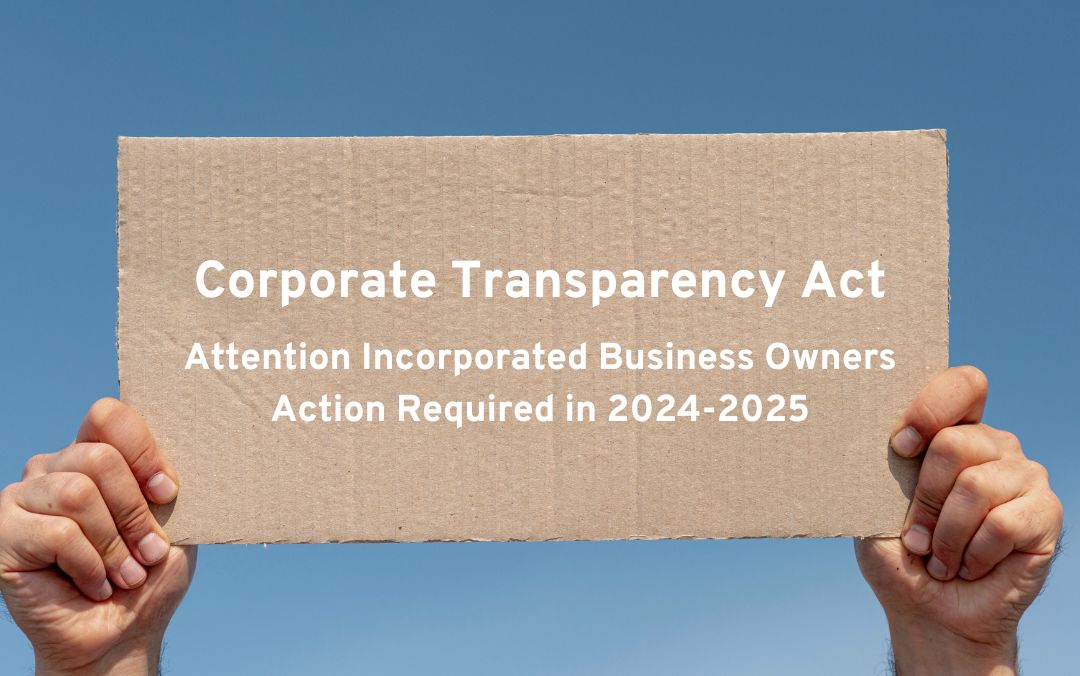
Each year brings its share of new laws and regulations. 2024 is no different. This article provides an overview of a significant new law known as The Corporate Transparency Act. The Corporate Transparency Act (CTA) was passed by Congress in December 2020 and took effect on January 1, 2024. The Treasury Department’s goal for the CTA is to prevent the laundering of illicit funds through anonymous companies in the United States.1 The gist of the CTA is that many companies formed or operating in the United States must now report information about their beneficial owners to the Treasury’s Financial Crimes Enforcement Network (FinCEN).
Let’s break down the CTA.
Who is affected by the Corporate Transparency Act?
Companies required to report their beneficial owners’ information (BOI) to the FinCEN are known as “reporting companies”. BOI refers to the individuals who ultimately own or control the company. 2 Reporting companies may be a corporation, a limited liability company (LLC), or an entity otherwise created in the United States by filing documents with a secretary of state or any similar office. Reporting companies also include foreign companies registered to do business in any U.S. state or on Indian tribal land.
The Corporate Transparency Act exempts certain entities from reporting. Examples of exempt entities include publicly traded companies and non-profits. In order to determine if your business needs to report, review the list of exempt entities to see if your business qualifies for an exemption. If not, you will need to report your company’s BOI before the filing deadline.
While there are many companies exempt from the filing requirements of the CTA, millions of businesses are now required by law to register their BOI, including millions of small and medium-sized businesses.
How and when do I file?
FinCEN has provided a secure online form for reporting companies to report their BOI information.3 FinCEN expects that most companies will be able to complete their reports using the guidance FinCEN has provided—any reporting companies that need help may seek the counsel of a professional accountant or lawyer.
There are no fees to file a BOI report.
Companies that were registered to do business before January 1, 2024, will have until January 1, 2025, to file their initial BOI report. Any reporting company registering to do business on or after January 1, 2024, and before January 1, 2025, will have 90 calendar days to file its initial BOI from the time a notice is received that its registration is effective or after a secretary of state or similar office first provides public notice of creation or registration, whichever comes first.
Reporting companies created or registered on or after January 1, 2025, will have 30 calendar days from actual or public notice that the company’s creation or registration is effective to file their initial BOI reports with FinCEN.
Who can file?
Anyone authorized by the reporting company to file on its behalf, such as an employee, owner, or third-party service provider.
What could this change for my business?
The short answer is that the CTA adds to the annual reporting requirements for the business. Businesses will need to maintain appropriate information about beneficial owners and update timely when there are changes in beneficial owners or beneficial owners’ reporting information. This is largely an administrative task but will require management to delegate responsibility to an appropriate person within the organization. In addition, companies will likely want to consider adopting a formal policy around CTA compliance.
The CTA does provide for civil and criminal penalties (including fines and jailtime) for non-compliance or the willful false, fraudulent, or incomplete filing of a BOI report.
Want help navigating your business through the Corporate Transparency Act? XPECT can help. XPECT is focused on helping businesses optimize business strategy, enhance operational effectiveness, and successfully leverage accounting as a strategic tool, so that business leaders can focus on the strategic aspects of growing the business and achieving business goals. Learn more.
Sources:
U.S. Department of the Treasury Actions to Prevent and Disrupt Corruption | U.S. Department of the Treasury
BOI Informational Brochure (fincen.gov)
BOI E-FILING (fincen.gov)
Beneficial Ownership Information Reporting | FinCEN.gov
